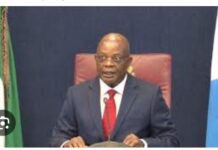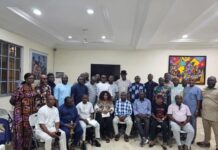ABUJA FCT, Nigeria — As President Bola Tinubu’s administration marks its first year in office, criticism over economic policies and the federal minimum wage proposal has intensified. The latest salvo came from Rufai Oseni, an anchor on Arise TV’s The Morning Show, who took to X (formerly Twitter) to lambast the president for failing to address workers’ salaries amidst unprecedented economic hardship.
Oseni’s Scathing Critique
In a pointed post, Oseni highlighted the stark realities facing Nigerian workers. “President Bola Tinubu has not demonstrated statecraft in allowing workers’ salaries to remain the same, one year after his economic policies unleashed the harshest hardship on Nigerians,” he tweeted. Oseni noted the contrast between the federal government’s proposed N57,000 minimum wage and the N70,000 offered by Edo and Cross River states. He emphasized that the federal figure fails to account for headline inflation, which has soared to 33.69 percent, the highest in 28 years, and food inflation at a staggering 40.53 percent, according to the National Bureau of Statistics (NBS).
The Inflation Conundrum
Oseni’s comments underscore a critical issue: the mismatch between wage adjustments and inflation rates. The N57,000 minimum wage proposed by the federal government does not align with the cost of living increases driven by rampant inflation. As essential goods and services become more expensive, the purchasing power of the average Nigerian worker has significantly diminished.
Public Reaction
The public response to Oseni’s critique has been swift and impassioned. Ndubuisi Emeka, another X user, responded with a harsh rebuke of Tinubu’s leadership capabilities. “You can’t give what you don’t have. During the election campaign, Tinubu could not make a clear statement without contradicting himself. That was a clear example that he is not mentally capable for the job of president but due to religious and tribal affiliation he was pushed there by force. His one year in office is a mess,” Emeka tweeted.
Emeka’s remarks reflect a broader discontent with the president’s performance, particularly regarding economic management and governance. The sentiment that Tinubu’s policies are inadequate in addressing the country’s economic challenges resonates with many Nigerians grappling with the effects of inflation and stagnant wages.
The Minimum Wage Debate
Economic Policies Under Scrutiny
Since taking office, Tinubu’s administration has implemented several economic policies aimed at stabilizing the economy. However, these measures have often resulted in unintended consequences, exacerbating the financial strain on ordinary Nigerians. Critics argue that while the intentions behind these policies may be sound, the execution and consideration of their impact on the populace have been lacking.
The removal of fuel subsidies, for instance, was intended to reduce government expenditure and channel funds into development projects. However, it led to a sharp increase in fuel prices, which in turn drove up transportation and production costs, contributing to inflation. Similarly, currency devaluation aimed at aligning the naira with market realities has increased the cost of imports, further burdening consumers.
A Call for Comprehensive Economic Reform
Economic analysts and stakeholders have called for comprehensive reforms that go beyond piecemeal adjustments. Addressing the root causes of inflation, such as supply chain disruptions and market inefficiencies, is crucial. Additionally, there is a need for policies that stimulate domestic production and reduce dependency on imports, thereby stabilizing prices and boosting local industries.
Investments in agriculture, infrastructure, and technology are seen as essential for long-term economic stability. By enhancing productivity and creating jobs, such investments can help mitigate the effects of inflation and improve living standards. Moreover, there is a growing consensus that wage policies must be dynamic, reflecting changes in the economic environment to protect workers’ real incomes.
Political Ramifications
The criticisms from prominent media figures like Rufai Oseni and the public’s growing discontent pose significant political challenges for Tinubu’s administration. As the country prepares for the next electoral cycle, the president’s handling of economic issues will undoubtedly be a major point of contention.
Opposition parties are likely to capitalize on the dissatisfaction, using it to galvanize support and challenge the ruling party’s narrative of progress and development. The government’s ability to address these economic concerns effectively will be critical in shaping the political landscape and influencing voter sentiment.
The Road Ahead
As President Tinubu navigates the complexities of economic governance, the pressure to deliver tangible improvements in living conditions is mounting. The administration’s ability to implement effective policies that curb inflation, boost wages, and stimulate economic growth will be pivotal in restoring public confidence.
Conclusion
The criticism from Rufai Oseni and the broader public underscores the urgent need for a reevaluation of economic policies. The current approach has left many Nigerians struggling to cope with rising costs and stagnant incomes. A more holistic and responsive economic strategy is necessary to address these challenges and ensure that the benefits of growth and development are felt by all.
In the meantime, the discourse surrounding the minimum wage and inflation serves as a potent reminder of the real-world impacts of policy decisions. As Nigeria charts its path forward, the voices of its citizens and their lived experiences must remain at the forefront of economic planning and governance.










